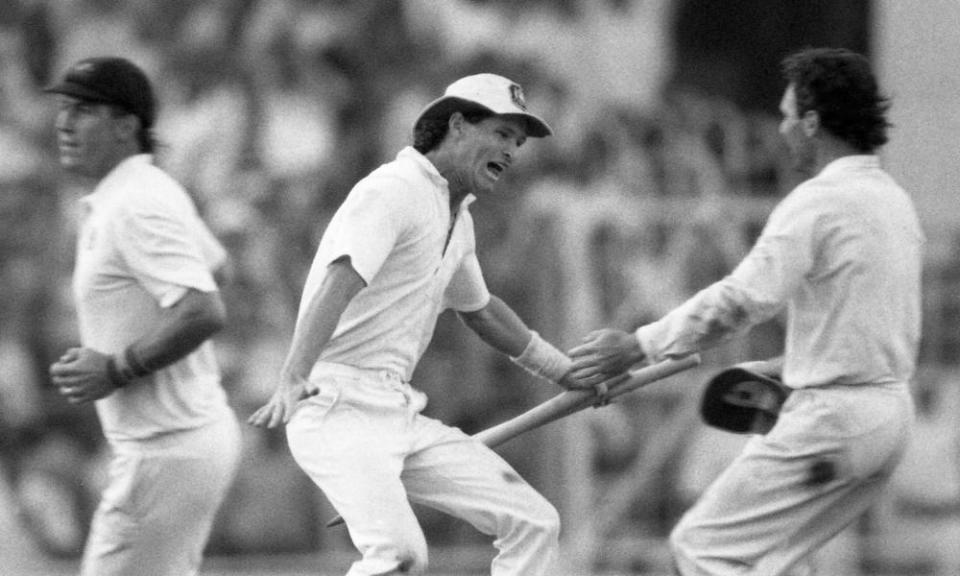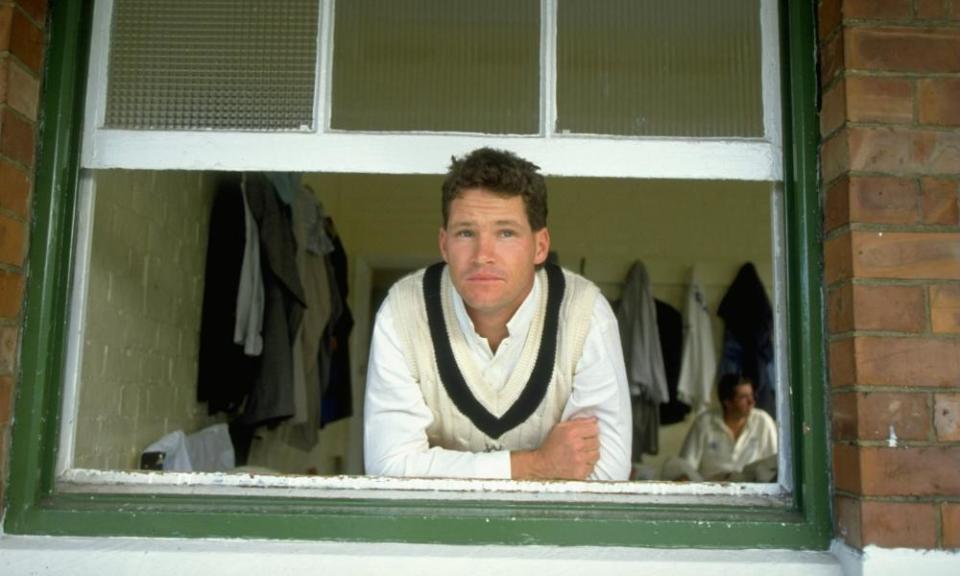Dean Jones obituary

Some cricketers made more runs. Some had better averages. But no Australian player of his time created more excitement or won more devotion than Dean Jones, who has died of a heart attack, aged 59. A transformative and captivating batsman, especially in the one-day format where he led the world in his pomp during the late 1980s and early 90s, Jones earned iconic status for his sparkling footwork, effervescent strokeplay, bold running between wickets, and the strip of zinc cream always pasted on his bottom lip.
A generation of Australian children, from his hometown of Melbourne to every corner of the continent, was compelled to watch him. They wanted to be him. Jones served as the gateway into a lifetime love of cricket played aggressively to the last. In the years after his career ended, his influence was clear on the T20 revolution that followed, one he embraced as a coach, broadcaster and columnist.
Born in the Melbourne suburb of Coburg, Jones followed in his father Barney’s steps to the Carlton Cricket Club, where he was a prodigy. He graduated to state ranks in 1982, one year later falling one run short of turning his maiden century for Victoria into a double. From the hard school of the Sheffield Shield, at the age of 22 he was picked for his first Australian tour in 1984 – the toughest assignment in the game at the time, visiting the Caribbean.
It was Jones’s debut innings for his country in Trinidad that he looked back on with most pride – not a day when he raised his bat, but when he made 48 against the fearsome West Indies on their own patch. It would be more than two years before he would get his next chance at Test cricket, but what followed was one of the most celebrated innings ever played. In the intense heat and humidity of Madras (now Chennai), he finished on 210 after more than 500 minutes in the middle, so dehydrated that he struggled to control bodily functions, partially lost his memory of the innings, and ended up in hospital on a drip.
This would go on to become only the second tied Test match. Underpinned by Jones’s bravery, it heralded not only the beginning of his own era but the start of a new one for Australian cricket. A year later, in 1987, back in India and against all expectations, they held aloft the World Cup for the first time, with Jones at No 3 instrumental. In 1989, when Allan Border’s men reclaimed the Ashes in England for the first time since 1934, it was Jones who struck two centuries, earning acclaim as one of Wisden’s five cricketers of the year. Twin tons against Pakistan the following home summer, along with a torrent of runs in Australia’s fluorescent one-day gold uniform, showed the man at his most prolific.
The pin-up of a cricket-mad nation, Jones dominated the one-day game like no Australian before him. Skipping down the track at fast bowlers and spinners alike, he attacked, come what may. His 145 at the Gabba (Brisbane Cricket Ground) against the touring English in 1990 was an innings before its time – an unbridled and ostentatious joy, blasting balls over the rope before it was routine. By now there was no doubt: Deano (always Deano, never Jones) was the best white-ball batsman on the planet.

“Sometimes I die by the sword,” he would later say of his approach, “but, by gee, I had a few kills along the way.” He sure did, reflected too in his whole-body boundary fielding or his sprints for each run, like an Olympian rather than a cricketer. He was always in a pair of sunglasses, as significant to the Jones portrait as the lump of gum he chewed whenever at the crease with a County or Kookaburra blade, batting bare-headed or with a cap or in his broad-brimmed floppy hat. You couldn’t look away.
This all-or-nothing attitude was on show in early 1993 when Jones made the ill-considered decision to demand Curtly Ambrose remove the sweatbands from his wrists during a limited-overs final. Not for the first or last time, he pulled the wrong rein that night, inspiring a match-winning spell from his adversary. In part, it was an act of defiance at the end of a summer during which he had lost his Test spot despite having clocked an unbeaten ton two matches earlier. He would not add to his 52 caps, with selectors seeing fit to dispense with his 11 centuries and average of 46.6.
Jones never truly got over this, nor did his disciples. In his return to the 50-over team in the following home summer, it was a matter of faith that he had been slighted; the wrong would be righted. But when he fell two runs short of a ton against South Africa, again in the heat of Brisbane – this time with an ice collar around his neck below the signature wide-brimmed hat – it signalled a last hurrah rather than an early-30s rebirth. Within months he was jettisoned again, this time prompting an impetuous retirement from international cricket.
Sure enough, there were twists. “If they keep saying I’m one of the best one-day players in the world, then why am I not there?” Jones declared when piling on runs in his majestic summer of 1994-95 with Victoria, including an unbeaten triple-ton on his beloved Melbourne Cricket Ground. But although he was available for selection before the 1996 World Cup, the call never came.
Bruised by it all, Jones made his point the best way he knew how. When Australia returned home as beaten finalists from that tournament, Melbourne’s favourite son turned out for a World XI playing against his former teammates. He duly saluted, bringing up his century with a six into the Southern Stand. His supporters bellowed his name that day just as they defended his every frustrated public utterance. However long he was out of favour, he never stopped being their guy.

A decade in the canary yellow produced 6,068 runs at an average of 45, including 53 scores beyond 50, as well as signs reading “BRING BACK DEANO” for a decade more. Domestic cricket had to fill an initial gap, first in England, leading Derbyshire to their best finish in six decades in 1996, then for Victoria until 1998 to complete his career with 12,668 runs across formats, at the time the record for that state.
Another chapter began beyond the boundary. While his thoughtful words in print were valued at home, it was in Asia that he was revered as a coach, ultimately leading to success at the helm of Islamabad United in the Pakistan Super League in 2016 and 2018. In 2017, when the trailblazing Afghanistan men’s team was in need of a coach at short notice, it was Jones who stepped in to do the job.
It was inevitable that Jones would court controversy as a broadcaster – he was remorseful to the end about a discriminatory remark in 2006 that insulted the South African Muslim batsman Hashim Amla. His years on the airwaves offered endless enterprising theories on the 20-over game, which he coached so well and would have been so suited to playing. He died the night after commentating on an Indian Premier League fixture.
Jones was appointed AM (member of the Order of Australia) in 2006 for services not just to cricket but to cancer fundraising. A year ago he was inducted into the Australian Cricket Hall of Fame. But there remained a lingering resentment at feeling insufficiently respected by decision-makers at home, resulting in him revoking his life membership with Cricket Victoria after being overlooked for two T20 coaching jobs.
Antipathy was part of Jones, but it never defined him. Instead, he’ll be remembered as a player first and foremost, for work on the field that lives on with those who saw it. It spoke volumes that he kept putting on the whites for his club well into his 40s in the city where he was adored, in a game that was blessed by his lifetime contribution.
Jones is survived by his wife, Jane, and their two daughters, Isabella and Phoebe.
• Dean Mervyn Jones, cricketer, born 24 March 1961; died 24 September 2020

 Yahoo News
Yahoo News 